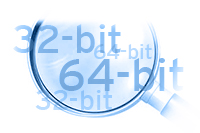 Are you thinking about purchasing a new computer? If so, you’ve probably noticed that Windows now seems to come in both 32-bit and 64-bit versions.
Are you thinking about purchasing a new computer? If so, you’ve probably noticed that Windows now seems to come in both 32-bit and 64-bit versions.
In truth, different versions of Windows have been available since Windows XP 64-bit was released in 2003, but most consumers did not notice because 64-bit Windows was rarely needed.
But times have changed, and consumers will now commonly have to choose between 32-bit and 64-bit versions of Windows. The battle of Windows 7 32-bit vs. Windows 7 64-bit will be resolved differently depending on your needs.
The Technical Mumbo-Jumbo
The difference between 32-bit and 64-bit versions of Windows is related to how processors deal with information. A 32-bit processor is capable of addressing up to 32 bits (a bit is a binary unit of data, either 0 or 1) at a time. A 64-bit processor, on the other hand, is capable of addressing up to 64 bits. The number of bits that can be addressed has a significant impact on the functionality of a computer.
However, in order to enable the extra functionality offered by a 64-bit processor, a 64-bit operating system must also be used. While simply increasing the number of bits a processor can address seems simple, it actually changes some fundamental ways in which the processor and operating system communicate, which is why 32-bit and 64-bit versions of Windows exist.
The Memory Differences
A 32-bit version of Windows can address up to four gigabytes of memory in total. This includes not only the RAM of your system, but also the video RAM from your video card and any other virtual memory. As a result, a typical computer with a 32-bit version of Windows will never have access to more than four gigabytes of RAM, no matter how many RAM sticks you stuff into the system.
64-bit Windows, however, can address up to sixteen terabytes of RAM. In practical terms, no computer is going to require that much RAM anytime soon. But some buyers might want to be able to use eight gigabytes of RAM, or even sixteen. If you are one of those users, you will need to have a 64-bit version of Windows.
Compatibility Questions
While being able to use more RAM is great, running a 64-bit version of Windows is not without disadvantages.
Because a 64-bit operating system is fundamentally different from a 32-bit one, the older drivers which you used for devices on a 32-bit version of Windows won’t work with a 64-bit version. Fortunately, most hardware vendors provide full support of 64-bit versions of Windows and the correct drivers can be downloaded online. However, if you have an old piece of hardware – perhaps from the early days of Windows XP, before consumers could buy a 64-bit version of Windows – there may not be a 64-bit driver available.
It is also possible that you will experience some performance degradation when running 32-bit programs. This is because Windows has to do a little extra heavy lifting to make sure the 32-bit program works correctly on the 64-bit version of Windows. The difference is typically minor, however, and most programs now ship with both 32-bit and 64-bit versions on the same disk.
Making the Leap
Eventually, all versions of Windows will be 64-bit. As software and hardware becomes more complex, four gigabytes of RAM just won’t cut it. This inevitability is still probably a decade away, however, so if you’re purchasing a computer today, it is a question of your needs right now.
If you are buying a gaming computer, a workstation, or a powerful laptop you will want to make sure that you have the 64-bit version of Windows so you don’t run into RAM limitations now or in the future. If you want a simple, low-cost desktop or laptop, Windows 32-bit is preferable. You won’t have to worry about compatibility and the RAM limitation will not be an issue.

